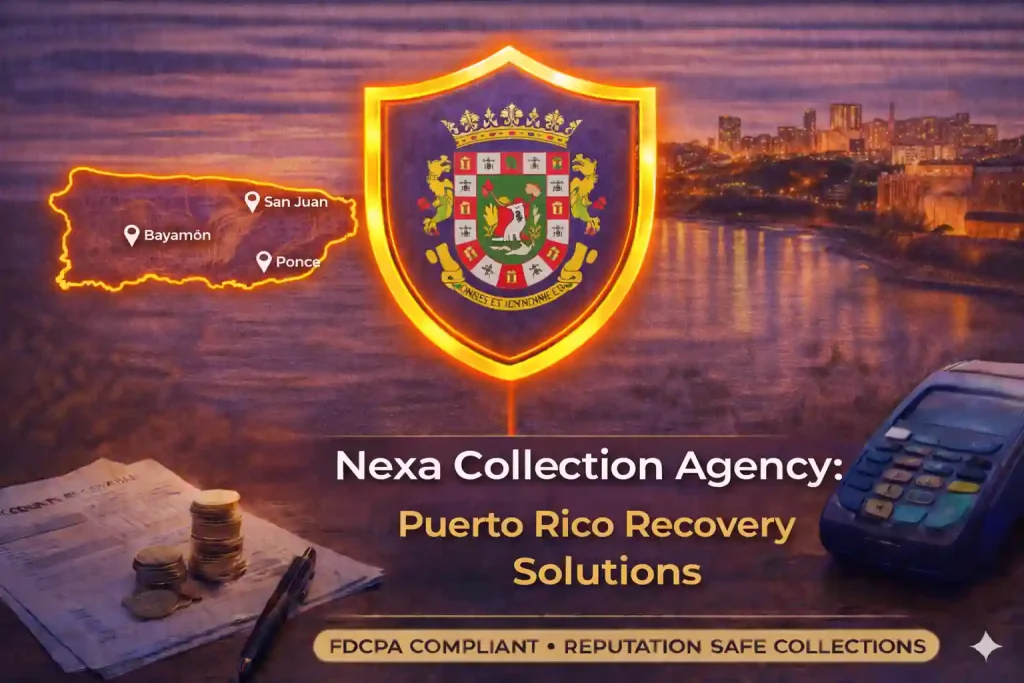En Puerto Rico—desde los hoteles de lujo en Isla Verde y Condado hasta las farmacéuticas de Barceloneta y los comercios de la Milla de Oro—sabemos lo que es “bregar” duro para echar hacia adelante. Pero en 2026, el que no se pone al día con el nuevo Código Civil, pierde. Con la fiscalización de DACO más fuerte que nunca y la prescripción de deudas a los 5 años, usted no puede darse el lujo de esperar. No deje que sus facturas se vuelvan sal y agua; en Nexa hablamos su idioma y sabemos cómo recuperar sus biles sin que usted pierda el sueño ni la reputación.
Nexa provides 100% reputation-safe, equipped with all 50-state collections license & PR, offering free credit reporting, free litigation/bankruptcy scrubs, and zero onboarding fees. Secure – SOC 2 Type II , DACO & HIPAA compliant.
Need a Collection Agency? Contact us
El Paisaje Legal en la Isla
Puerto Rico se rige por el Derecho Civil, lo que significa que las reglas aquí son distintas a las del “Mainland”. Si usted piensa que tiene 10 años para cobrar, su deuda podría estar ya “muerta”.
| Tipo de Deuda | Tiempo para Cobrar (Prescripción) | Base Legal |
| Acciones Personales (Deuda General) | 5 Años | Código Civil Art. 1201 |
| Pagarés / Notas Promisorias | 3 Años | Código de Comercio Art. 946 |
| Servicios Médicos / Salud | 3 Años | Código Civil Art. 1203 |
| Embargo de Salario | Solo el 25% (75% protegido) | Regla 56.4 Proc. Civil |
| Sentencias Judiciales | 15 Años (Renovable) | Código Civil Art. 1201 |
Reglas Críticas para el 2026 en P.R.:
-
El “Barranco” de los 5 Años: Con el nuevo Código Civil, su tiempo se redujo drásticamente. Nexa audita sus cuentas para identificar cuáles están a punto de “vencerse” y las activa de inmediato.
-
Reglamento 9037 de DACO: El Departamento de Asuntos del Consumidor prohíbe el hostigamiento. Nexa utiliza mediación bilingüe profesional que cumple 100% con DACO para evitarle multas a su negocio.
-
Interrupción Extrajudicial: En P.R., una carta certificada bien redactada puede reiniciar el reloj de la prescripción. Nosotros nos encargamos de enviar estas reclamaciones para que su derecho al cobro no expire.
-
Protección Salarial: Aquí se protege el 75% del salario. Por eso, Nexa se enfoca en identificar activos, cuentas bancarias y otras propiedades para asegurar que el recobro sea real.
Costo-Efectividad: La Ventaja de Nexa
-
Servicio de Tarifa Fija ($15 por cuenta): Ideal para cuentas nuevas. El deudor le paga el 100% directamente a usted. Sin comisiones de por medio.
-
Servicio de Contingencia (20%–40%): Cobro basado en resultados. Si no recobramos sus chavos, usted no paga ni un centavo.
Industrias que Servimos en Puerto Rico
-
Turismo y Hospitalidad: Atendiendo la “Economía del Visitante”. Recuperamos facturas de eventos, cancelaciones y deudas de huéspedes en hoteles y paradores de San Juan hasta Rincón. Sabemos cómo cobrarle al turista que ya se fue de la isla.
-
Farmacéuticas y Manufactura: Cobro B2B especializado para el sector industrial de Pharma-Coast. Manejamos disputas de logística y suplidores con precisión bilingüe.
-
Salud y Servicios Médicos: 100% cumplimiento con HIPAA. Navegamos la prescripción de 3 años en servicios médicos, usando una mediación empática para que su oficina médica no pierda pacientes ni dinero.
-
Universidades y Colegios: Manejamos el recobro de matrículas y cuotas de vivienda con un enfoque diplomático que respeta los ciclos de becas y el “Bono de Navidad” local.
-
Contadores y Firmas de CPA: Recobro de honorarios profesionales. Entendemos los ciclos de planillas de Hacienda y cobramos lo suyo sin dañar la confianza con sus clientes.
-
Bancos y Cooperativas de Ahorro y Crédito: Expertos en préstamos personales y comerciales atrasados, utilizando las leyes de hipotecas y sentencias de la isla.
-
Construcción y Contratistas: Recuperación de pagos para HVAC, eléctricos y contratistas generales. Expertos en gravámenes (Liens) bajo el Código Civil.
-
Comercio B2B, Restauración y Logística: Recuperación rápida para empresas que no pueden permitirse tener el dinero “estancao” mientras los costos de operación suben.
Resultados de Recobro Recientes en P.R.
Caso 1: Resort de Lujo en el Área Metro (Turismo)
-
El Problema: $95,000 en facturas de eventos corporativos de una empresa de EE.UU. que no quería pagar.
-
El Resultado: Nexa utilizó su red interestatal y mediación bilingüe para recuperar los $95,000 completos en 45 días, sin tener que pisar el tribunal.
Caso 2: Centro de Especialistas en Bayamón (Médico)
-
The Problem: $120,000 en deudas de pacientes que estaban a punto de cumplir los 3 años de prescripción.
-
El Resultado: Implementamos un plan de “Reclamación Extrajudicial” y recuperamos $82,000 en 70 días, salvando legalmente el resto de las cuentas.
Preguntas Frecuentes (FAQ)
1. ¿Todavía puedo cobrar una deuda vieja de más de 5 años?
Si la deuda nació después de 2020, el límite es generalmente 5 años. Pero, si usted hizo una reclamación formal antes, el tiempo pudo haberse reiniciado. Nexa le hace una auditoría gratis para ver si su deuda sigue viva.
2. ¿DACO prohíbe llamar a los deudores en Puerto Rico?
No lo prohíbe, pero lo regula estrictamente (Reglamento 9037). Nexa conoce las horas y frecuencias permitidas para que su negocio no se meta en problemas legales.
3. ¿Qué es eso de “Cuentas Claras”?
Es el estándar de transparencia que exigimos. Usted tendrá reportes en tiempo real de cada “vello” y cada peso que estemos gestionando para usted.
Nosotros cobramos sus cuentas morosasNeed a Collection Agency (Agencia de cobros) in PR? Contact us |

